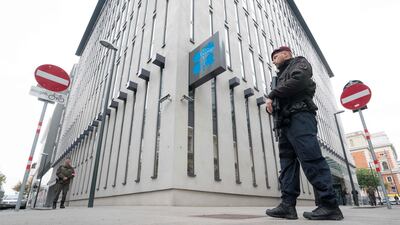Opec will need to extend supply cuts when it meets next week to end years of global oil oversupply, oil ministers said on Wednesday, just over a week before the group meets in Vienna to discuss supply policy.
Opec, non-member Russia and nine other producers agreed to curb oil output by about 1.8 million barrels per day until March 2018. They are expected to extend the deal at a November 30 meeting in Vienna.
Top crude exporter Saudi Arabia is lobbying oil ministers to extend output cuts by nine months, sources familiar with the matter said.
Opec has been successful in bringing global oil inventories closer to their five-year average, but the group needs more time to tighten supply further, he said.
___________
Read more:
Oil prices firm on expected extension to OPEC output cuts
Fuel consumption falls across the region
___________
The oil market has found some balance as inventories decline, Venezuela's oil minister Eulogio Del Pino said on the sidelines of a gas exporter meeting in Santa Cruz, Bolivia, on Wednesday. He put the optimal price for crude at between US$60 and $70 dollars a barrel to encourage investment.
US crude hit a two-year high of $58.05 a barrel on Wednesday, while Brent crude rose 55 cents, or 0.9 per cent, to $63.12 a barrel.
Rising US shale oil production has made it harder for Opec to reduce the global glut. US output hit a weekly record this week at more than 9.6 million bpd, approaching the 10 million bpd monthly record output levels reached in the 1970s.
The gas market, which is also facing oversupply due to growing output of shale gas and rising production of liquefied natural gas (LNG), could find a balance around 2025 after the excess of supply peaks in 2020, analysts said.
The chairman of Spain's Repsol, Antonio Brufau, said the global gas market is undergoing a deep transformation with rising LNG supply, lower production costs and traditional suppliers considering non-conventional projects such as shale.
"LNG is shaking up the market," he said.

